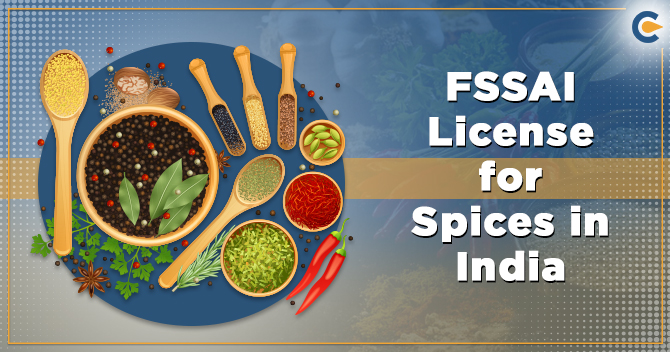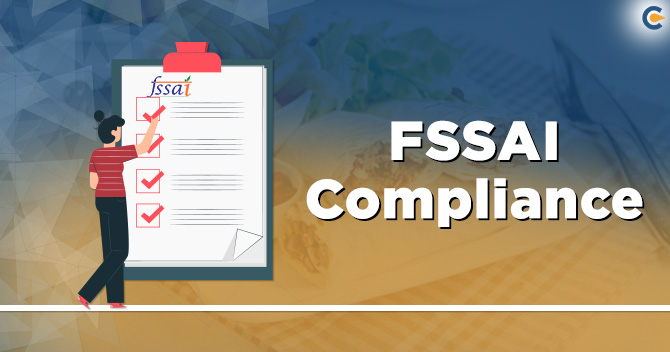As per the data of the International Organization for Standardization (ISO), the manufacturer of spices in India produced about 75 varieties of spices for which they will certably in need of FSSAI license for spices. An Indian manufacturer exports almost all types of spices across the globe. The leading importers of Indian spices are the US, China, UAE, Srilanka, UK, Thailand, and Vietnam.
Legal Obligation for Spice Manufacturer
The spice manufacturers are required to obtain FSSAI license for spices to produce the spices for the commercial purpose. In the case of export, the manufacturers also require to avail of the FSSAI central license. Some of the primary ranges of spices that are exported from India are cardamom, turmeric, vanilla, pepper, tamarind, turmeric, and coriander. With more than one million tons of export annually, spices are still perceived as the frontrunner among all the trade commodities in India. FSSAI license for spices manufacturers is a mandatory requirement.
What is the Present Condition of Export and Production of Spices in India?
It must be noted that the spice production in India is remarkably huge. The demand for the spices like turmeric, pepper nutmeg, cardamom, fennel, cumin, chili, is considerably higher and escalating every passing year. In 2017, our country manages to export more than 1,028,060 tons between 2017 and March 2018, with chili tops the chart of export with gross production of 8.4 million tons. Approx. 402699.30 metric tons of chili was exported to the overseas market between April 2017 and March 2018
Regulatory Guidelines framed by FSSAI to oversee the Quality of Spice
Standards of 30 spices and condiments including Cassia, Cumin, Cardamom, Cloves, chilies, cinnamon, etc, are mentioned in the Food Safety and Standards Regulation’ 2011[1]. According to the FSSAI regulations, the sale of powered spices & condiments in loose form is strictly forbidden. It also prohibits the sale of compounded asafetida exceeding one kilogram in weight except in a sealed container with proper labeling. The following tables show the allowable limits of extraneous matters, total ash, volatile oil content, moisture content, insect-damaged matter, etc for the given spices:
Seed powder & Cardamom seed (chhoti elaichi)
These are the dried capsules of Elettaria cardamomum L. Maton Var. Minuscula Burkill. The capsule may be brown to light green or white or pale cream when bleached with So2 (Sulphur Dioxide). It should be free from rancidity, foreign odor, dead insect, and rodent contamination, Thrips marks should not be deemed as the indicator of infection or contamination. The product should not be adulterated with harmful substances. The standards laid by FSSAI are based on:


Cardamom is generally regarded as the queen of spices and it is a dried fruit of Elettaria cardamomum. Cardamom should intact a characteristic odor or and ought to be free from any rancidity.
Chilies and Capsicum whole and powder (lal mirchi)
These are the dried fruits of Capsicum annum and Capsicum frutescens. Chili powder should not contain edible oil more than 2% by weight. Also, the specification for the same should be properly printed on the label as it is a mandatory requirement.
Cinnamon whole and powder (dalchini)
Cinnamon is the inner bark & branches of Cinnamomum zeylanicum. The food safety and Standards Authority of India vide Food Safety & Standards regulations have laid down the standards for Cassia and Cinnamon. The cinnamon & cassia adheres to different chemical compositions. Cassia acts as the cheapest substitute for cinnamon and it contains coumarin to a considerable amount. When used in excess, coumarin could jeopardize human life and hence it should be rectified accordingly.
FSSAI has already taken the required measure to curb such anomalies by laying down certain guidelines. As per the updated norms, the coumarin content has been limited to 0.3% by weight. The new standards would let the consumer differentiate between cassia and cinnamon easily.
Type of FSSAI license for Spices Manufacturer
There are three type of FSSAI license for spices available to the FBOs in India, which are as follow:
Basic FSSAI Registration
FSSAI Food safety Registration is a must-have requirement for anyone who is willing to establish a food business. The FSSAI license not only regulates the manufacturing of the edible item but also supervises processing and distribution of the same to ensure the safety of the individual who will ultimately be going to consume it.
State FSSAI License Registration
As mentioned earlier, the Food Standards and Safety Authority of India (FSSAI) is the only legal body in the nation that oversee food safety inside out. So it becomes important for the business owner to get the FSSAI Food safety License Registration as per the law. Businesses having yearly revenue between Rs 12 lakhs to 20 crores can opt for the FSSAI state license.
Food business operators (FBOs), transporters, distributors, storage units, are however required to avail of the FSSAI State License Registration. FSSAI License is absolutely compulsory for those who want to do food business in the country. FSSAI License doesn’t only oversee the preparation phase of the food item but also look into various stage before it dispatched to the end-users.
Central FSSAI License Registration
Business entities whose yearly revenue is well-above Rs 20 crore can apply for FSSAI central license. Eligible FBOs, manufacture, railways, operators in central government, seaport, airport, etc are liable to acquire Central FSSAI license from the FSSAI.
What are the Common Documents required to Avail FSSAI Registration for Spice Business?
- Form B (Self Attest via Signature)
- Floor plan of the premises where the processing of spices takes place.
- List of the core member of the company such as Directors/ Partners/ Proprietor along with their contact details, address, and photographs.
- List of the installed machinery with complete details such as their brand name, dimension, production capacity, and specification.
- List of species to be processed.
- Authority letter from the owner of the manufacturing facility.
- Water analysis report (Latest one)
- Proof of ownership of the premises.
- Affidavit of proprietorship/ Partnership deed, if any.
- No objection certification from the Owner of the premises
- Copy of certificate obtained under the Cooperative Societies Act, 2002, if any.
- Food safety Management System Plan/Certificate
- Form IX – Nomination Of Persons By A Company
- NOC from the Municipal Corporation.
- Supporting documentation regarding proof of transportation and Turnover
- Declaration form
Conclusion
Adulteration is common in spices and could prove to be toxic if used in excess. The Authority like FSSAI is well aware of this fact and has underpinned some precise guidelines for the same. These guidelines direct the manufacturers to produce species in a control regime to ensure human safety. Apparently, any violation of such guidelines could land the business in the vicinity of penalties. If you need FSSAI license for spices without any hassle or legal obstacle then feel free to contact CorpBiz.
Read our article: NDMC Has No Right to Prompt FOBs to Raise Additional License: FSSAI











